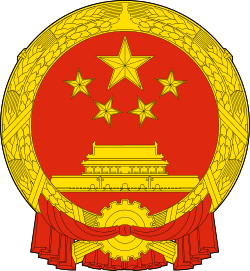Yu Qiuli

Yu Qiuli (Chinese: 余秋里; pinyin: Yú Qiūlǐ; 15 November 1914 – 3 February 1999) was vice prime minister of China from 1975 until 1982 and was a member of the Politburo of the Communist Party of China. He was also a lieutenant general of the People's Liberation Army, and served as Deputy Secretary-General of China's Central Military Commission and Director of the PLA General Political Department from 1982 to 1987.
Yu Qiuli was one of the last of the Long March generation of Chinese leaders who survived the epic journey by Communist forces across China in the mid-1930s to become an important figure in the administrations of Mao Zedong and Deng Xiaoping. Yu was a soldier-bureaucrat who founded China's modern oil industry and helped Deng modernise his army.
By the time of his death, Yu had ceased to be one of the central figures in Chinese policy-making for more than a decade. But he had continued, like other former leaders of his generation, to keep up to date with state affairs by carrying out frequent inspection tours around the country. He was particularly involved in efforts to promote the economies of the former base areas of the Communist guerrilla armies, many of which are still mired in poverty.
Early life
Yu's background was typical of a Communist guerrilla commander who turned to be a national leader. He was born in 1914, three years after the collapse of China's last imperial dynasty, into a poor peasant family. By the age of 14 he had taken part in a peasant uprising. At 16 he joined the Communist Party. Yu was among the tens of thousands of guerrillas and their supporters who from 1934 joined the Long March in an effort to break through the Kuomintang blockades around the Communist base in the south. In 1936, he was injured in the arm during a skirmish with pursuing nationalist forces. He continued on the journey north over treacherous terrain. Nine months later, after he had completed a journey of thousands of miles in terrible pain, his arm was amputated. "I am a man who has gone through nine deaths," Yu told the American journalist Harrison Salisbury in 1984. During the Second Sino-Japanese War of 1937-1945 and the subsequent Chinese Civil War, Yu was a leading political commissar and training officer in the Communist forces.
People's Republic of China
After the Communist victory in 1949, he became the head of a military academy and thereafter held various posts in the central military command, including the head of the military's financial affairs. He rose to the rank of lieutenant- general. In 1958, Yu was appointed minister of the petroleum industry. The move thrust him into a far more prominent role in the fledgling Communist government. In the following year, the discovery of huge oil reserves in Daqing in the desolate wastes of north-eastern China gave him a mission that on its own would ensure his place in Communist China's history books. Yu's task was to turn Daqing into a model of Chinese industry. Under Yu's direction, the mosquito-infested marshland - in winter an expanse of ice - was transformed into China's biggest oil production centre. Daqing was written into the Communist lexicon as a name synonymous with proletarian heroism. It produced the famous Maoist icon Iron Man Wang, who, in order to stop a blow-out, leapt into a pool of liquid concrete to mix it using his own body. After his success in Daqing, Yu went on to establish several more major production centres. In 1964, China declared itself self-sufficient in oil. That year, Yu was moved into the most important government ministry related to the economy, the State Planning Commission, as deputy chief.
In 1965, Mao made him the top drafter of the third Five Year Plan and put him in charge of relocating major industries to the remote hinterland of south-western China. Despite the claim of his official biographer that Yu suffered severe persecution during the tumultuous Cultural Revolution that began in 1966, he appears to have suffered less harm than many of his colleagues. In 1975, he was appointed deputy prime minister, as was Deng.
After the death of Mao in 1976, Yu was promoted to the ruling Politburo. He was a member of what is commonly referred to as the "petroleum faction", a group of senior officials who advocated using the profits from petroleum exports to finance high technology imports from the West. These officials were essentially conservative Stalinists in their economic thinking, favouring central planning and heavy industry - a strategy that clashed with that of the ascendant Deng. As Deng's political fortunes rose in the late 1970s, those of the petroleum faction waned. Yu was forced to make a self-criticism after the collapse of a Japanese-made oil rig in the Bohai Gulf in 1979. He was transferred from the chairmanship of the State Planning Commission to the less high-profile post of head of the State Energy Commission. In 1982, however, Yu was back in uniform as head of the military's General Political Department. His predecessor in this role had been ousted after the publication of an article in the military newspaper criticising Deng's policies. Despite his differences with Deng over economic policy, Yu was apparently still regarded as someone who was relatively unfettered by old-style Maoist ideology and could therefore help the military to modernise. His official obituary says that he focused on ridding the military of "leftist" - in other words radical Maoist - thinking. Yu retired from the Politburo and other significant posts in 1987.
Bibliography
- Salisbury, Harrison E. The New Emperors ISBN 0-380-72025-6
External links
"Obituary: Yu Qiuli", The Independent, Feb 20, 1999 by James Miles

